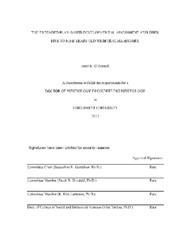| dc.description.abstract | Children who have experienced trauma and abuse require special provisions to navigate successfully through the initial phase of therapy, in particular the assessment process (Briere, Johnson, Bissada, Damon, Crouch, & Gill, 2006; Nader, 2008), which suggests the use of a more child friendly, play-based model of assessment (Shelby & Berk, 2009; Cattanach, 2008; Gil, 2006; Greenspan & Greenspan, 2003). The Extended Play-Based Development Assessment (EPBDA), developed by Eliana Gil (2011), is an integrated assessment model that uses directive and nondirective play approaches, intended to recognize the developmental levels of the different ages, and offers a step by step procedure for standardized use. The purpose of this study was to explore the experiences of participants using the EPBDA following a qualitative, collective case design. Data collection included interviews, questionnaires, direct observation, therapist field notes, and audio/visual materials. The participants included four children with a trauma history, between the ages of five and nine years of age. Further, the study examined the experiences of the parents and therapist. From the constructivism perspective, this study focused on the participant's viewpoint, the play room setting in which experiences were made, and the meanings behind those experiences. Themes that emerged from this study included the experiences of enjoyment, calmness, and enrichment. Conclusions drawn from this study are in close alignment with the theoretical material that justifies play-based assessment as a practical clinical method. The results of this study will contribute to the body of knowledge in play therapy and the assessment of children with a trauma history; moreover, this study utilized a practical model that a therapist can easily replicate in clinical practice and research. | en |


 Maintained by the Northwest University Library
Maintained by the Northwest University Library